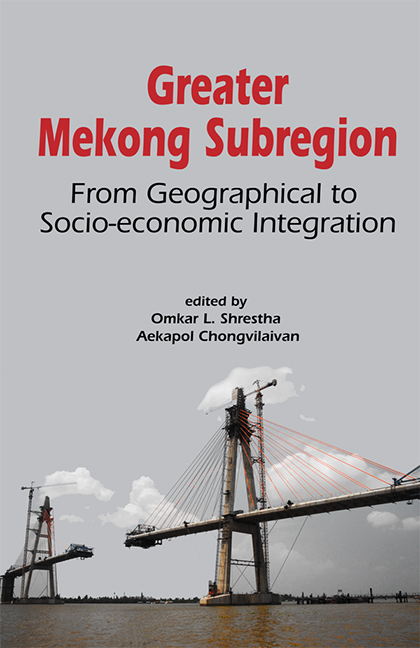Book contents
- Frontmatter
- Contents
- Preface
- List of Abbreviations
- Contributors
- 1 Greater Mekong Subregion: From Geographical Corridors to Socio-economic Corridors
- 2 Cambodia, Its Development, and Integration into the GMS: A Work in Progress
- 3 Subregional Connectivity in the Lao PDR: From Land-locked Disadvantage to Land-linked Advantage
- 4 The Economic Development of Myanmar and the Relevance of the Greater Mekong Subregion
- 5 GMS Challenges for Thailand
- 6 Deepening GMS Cooperation in a More Integrated ASEAN and East Asia
- 7 China (Yunnan)–GMS Economic Cooperation: New Development and New Problems
- 8 Trade and Investment in the Greater Mekong Subregion: Remaining Challenges and the Unfinished Policy Agenda
- 9 Enhancing Financial Cooperation among the GMS Countries
- 10 The Challenges of GMS Regional Integration: Case Study of Governance of the Logistics Industry in Thailand
- 11 Energy Sector Integration for Low-carbon Development in the GMS: Towards a Model of South-South Cooperation
- 12 Linking the Social to the Economic: Broadened Ambitions and Multiple Mitigations in New Mekong Corridors
- Index
9 - Enhancing Financial Cooperation among the GMS Countries
Published online by Cambridge University Press: 21 October 2015
- Frontmatter
- Contents
- Preface
- List of Abbreviations
- Contributors
- 1 Greater Mekong Subregion: From Geographical Corridors to Socio-economic Corridors
- 2 Cambodia, Its Development, and Integration into the GMS: A Work in Progress
- 3 Subregional Connectivity in the Lao PDR: From Land-locked Disadvantage to Land-linked Advantage
- 4 The Economic Development of Myanmar and the Relevance of the Greater Mekong Subregion
- 5 GMS Challenges for Thailand
- 6 Deepening GMS Cooperation in a More Integrated ASEAN and East Asia
- 7 China (Yunnan)–GMS Economic Cooperation: New Development and New Problems
- 8 Trade and Investment in the Greater Mekong Subregion: Remaining Challenges and the Unfinished Policy Agenda
- 9 Enhancing Financial Cooperation among the GMS Countries
- 10 The Challenges of GMS Regional Integration: Case Study of Governance of the Logistics Industry in Thailand
- 11 Energy Sector Integration for Low-carbon Development in the GMS: Towards a Model of South-South Cooperation
- 12 Linking the Social to the Economic: Broadened Ambitions and Multiple Mitigations in New Mekong Corridors
- Index
Summary
Financial market development is critical for economic development. This chapter explores the ways by which international financial cooperation — defined broadly to include cooperation in financial market infrastructure development, regulation, as well as the advancement of cross-border financial integration — can help the countries of the Greater Mekong Subregion (which comprises Cambodia, the Lao PDR, Myanmar, Thailand, Vietnam, and the Yunnan Province of the People's Republic of China) to foster the development of domestic and regional financial markets. The next section will briefly discuss why financial markets matter for overall economic development. The following section then discusses the benefits of regional financial cooperation for financial sector development in the GMS countries.
Why financial market development matters
The global financial crisis has forcefully shown the destructive potential of finance. Instead of being a lubricator of economic growth, the financial sector is now dragging down the real economy. Yet, as counter-intuitive as it might seem at first, one of the messages that policymakers in developing countries and emerging markets should take away from the current mess is that their economies need deeper financial markets, including capital markets, not less of them.
When examining the causes of the crisis, it is important to recognize that the crisis was first and foremost a consequence of inadequate supervision and regulation of financial firms (or in part even the complete lack of regulation, as in the shadow financial sector). The crisis is a long overdue reminder that perfect markets do not exist. It is astonishing how the efficient market hypothesis could rise to such prominence given the long and well-documented history of financial manias, panics, and crashes (for example, Kindleberger and Aliber 2005; Garber 2000). Irrational behaviour and phenomena such as speculative bubbles, collective mood swings, herd behaviour, bandwagon effects, panic trading, or trading by agents caught in liquidity shortage, have been long known in financial markets. A misguided belief in the self-regulating abilities of financial markets led to the devastating consequences that we are facing today.
What is to blame are not financial markets as such, but financial markets in which actors were driven by wrong incentive structures that had completely detached from the “real economy” — not least because regulators allowed excessive risk taking and a huge shadow financial sector to develop.
- Type
- Chapter
- Information
- Greater Mekong SubregionFrom Geographical to Socio-economic Integration, pp. 162 - 171Publisher: ISEAS–Yusof Ishak InstitutePrint publication year: 2013

